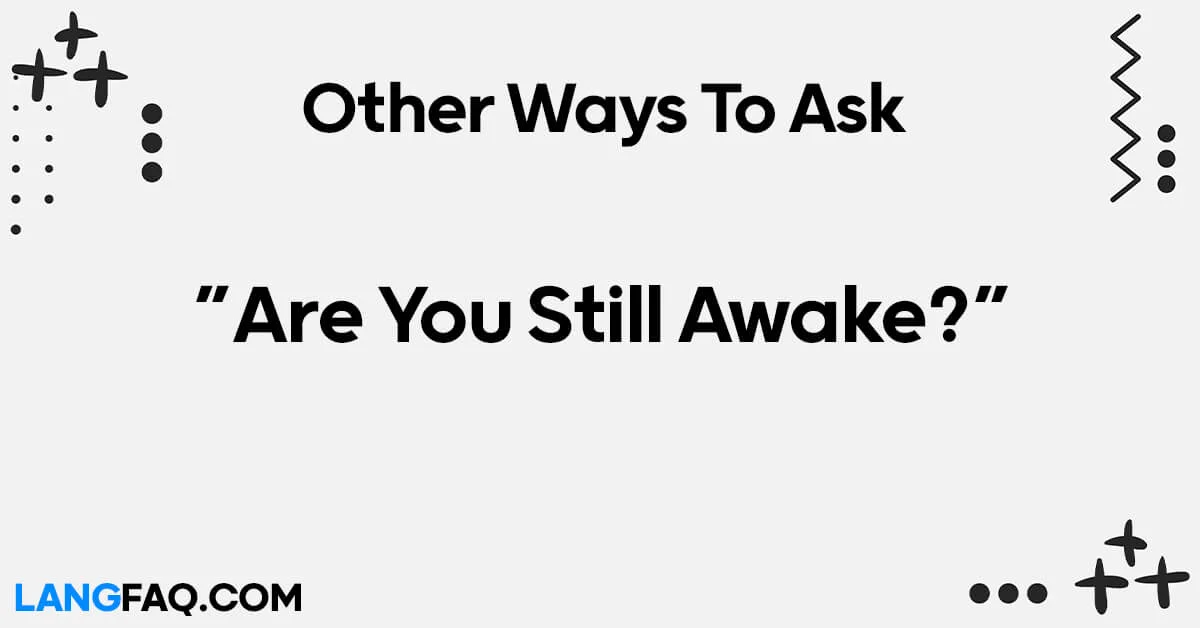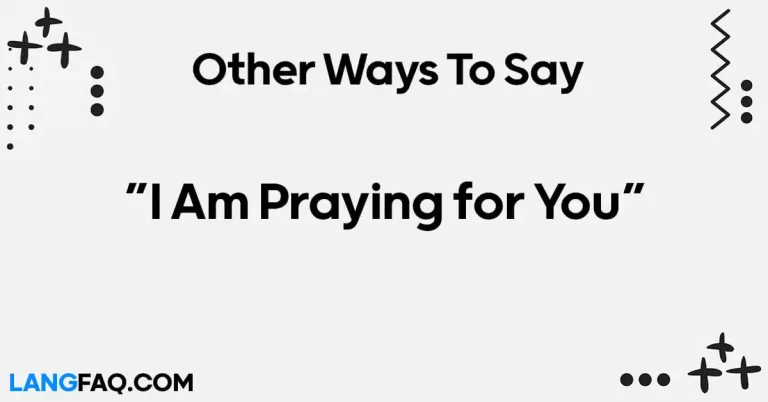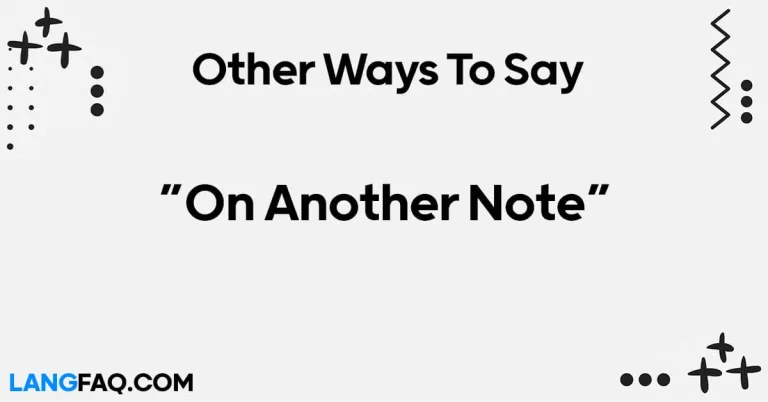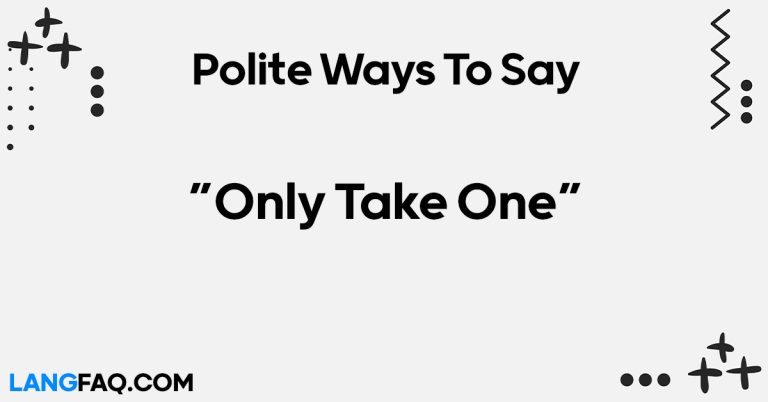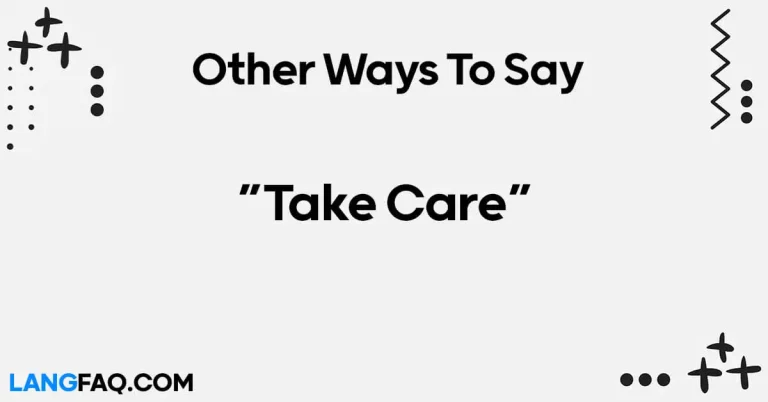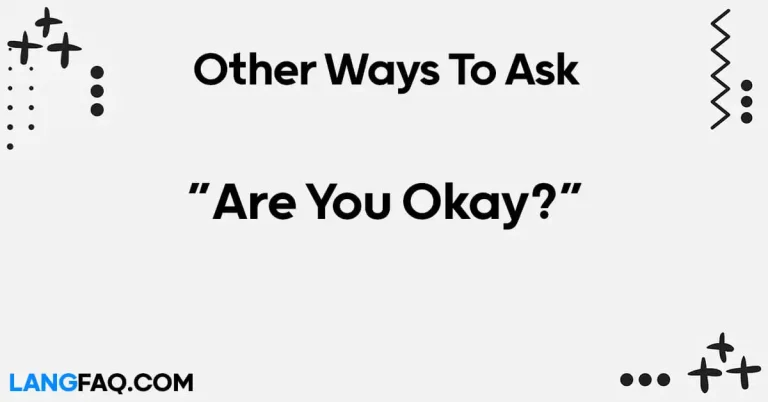Welcome to a journey of linguistic creativity and connection! In this article, we delve into unique ways to ask the common question, “Are You Still Awake?” From playful phrases to poetic expressions, let’s explore 12 alternatives that bring a fresh perspective to staying awake.
Is It Correct to Say “Are You Still Awake?”?
Yes, “Are you still awake?” is a grammatically correct and commonly used phrase in English. This question is often employed when inquiring about someone’s current state of alertness or whether they are still conscious and not yet asleep. It’s a straightforward and polite way to check if someone is available or responsive, especially in the context of late-night or early-morning communication.
The structure of the sentence is correct, using the auxiliary verb “are” with the subject “you,” followed by the adverb “still” to inquire about the ongoing state of being awake. This question is suitable for both formal and informal situations, making it versatile in various conversational settings.
Professional Mail Example With “Are You Still Awake?”
Subject: Urgent Project Update – Are You Still Awake?
Dear [Recipient’s Name],
I trust this email finds you well. I apologize for the late-night correspondence, but there have been significant developments on the project that require your attention.
Considering the time zone differences and the urgency of the matter, I wanted to reach out and confirm your availability. Are you still awake and able to review the attached project update? Your insights and approval are crucial to ensuring we stay on track with our timelines.
If it’s more convenient, we can schedule a meeting for a later time that aligns with your schedule. Please let me know your current status, and if you’re available for a brief discussion within the next hour.
I appreciate your dedication to the project and your timely response in this matter.
Thank you, [Your Full Name] [Your Position] [Your Company] [Contact Information]
12 Other Ways to Ask “Are You Still Awake?”
In the Midnight Hour
Understanding the Charm of Late-Night Productivity
In the realm of late-night conversations, the phrase “Are you burning the midnight oil?” carries a certain charm, invoking images of dedication and hard work. This expression is ideal for formal contexts, especially in professional settings where someone is putting in extra effort to meet deadlines or accomplish tasks.
Example Sentence: Formal Context (Colleagues): Colleague 1: “I noticed you’re online quite late. Are you burning the midnight oil on the project?”
Informal Context (Friends): Friend 1: “Hey, are you burning the midnight oil working on that side hustle of yours?”
Email Sample:
Subject: Late-Night Efforts on the Project
Hi [Colleague’s Name],
I hope this email finds you well. I couldn’t help but notice your dedication to the project, burning the midnight oil. Your commitment truly shines through, and I appreciate the extra effort you’re putting in.
Best regards, [Your Name]
Variation for Mentor-Mentee Context: Mentee: “I’m struggling with this task, and I’ve been burning the midnight oil to get it done. Any advice?” Mentor: “I understand. Burning the midnight oil shows dedication. Let’s discuss strategies to make it more manageable.”
Dictionary Insight:
According to the Cambridge Dictionary, “burning the midnight oil” means working late into the night or early morning hours.
Pros:
- Conveys a strong sense of dedication.
- Suitable for formal and professional contexts.
Cons:
- May be perceived as overused in certain informal settings.
Tips:
Use this expression when acknowledging someone’s commitment to a task or project. Ensure it aligns with the formality of the conversation.
Burning the Midnight Candle
Embracing Classic Elegance in Late-Night Pursuits
“Burning the midnight candle” is a timeless expression that adds a touch of elegance to acknowledging someone’s late-night endeavors. This phrase is versatile, suitable for both formal and informal contexts, making it a perfect choice when you want to appreciate someone’s dedication in a sophisticated manner.
Example Sentence: Formal Context (Colleagues): Colleague 1: “I received your email update late last night. Are you burning the midnight candle to meet the project deadline?”
Informal Context (Friends): Friend 1: “I saw your Instagram post at 2 AM. Burning the midnight candle, huh? What’s the project?”
Email Sample:
Subject: Late-Night Commitment
Dear [Recipient’s Name],
Your commitment to your work is truly admirable. I noticed you’re burning the midnight candle to meet our project goals. Your efforts don’t go unnoticed.
Best regards, [Your Name]
Variation for Mentor-Mentee Context: Mentee: “I’ve been burning the midnight candle on this research. Any tips on managing late-night work?” Mentor: “Burning the midnight candle is a sign of dedication. Let’s discuss ways to balance your workload effectively.”
Dictionary Insight:
The phrase “burning the midnight candle” is a metaphor for working late into the night, often implying hard work and dedication.
Pros:
- Evokes a sense of classic elegance.
- Suitable for both formal and informal settings.
Cons:
- Might be considered slightly archaic in very casual conversations.
Tips:
Use this expression when you want to acknowledge someone’s commitment with a touch of sophistication. Ensure it aligns with the tone of the conversation.
In the Wee Hours
Playful Inquiries into the Late-Night Mystique
“In the wee hours” introduces a playful and whimsical touch to the question of staying awake. This expression can be effectively used in both formal and informal contexts, adding a sense of curiosity and lightness to the conversation.
Example Sentence: Formal Context (Colleagues): Colleague 1: “I received your report update in the wee hours. Burning the midnight oil, or just night owl tendencies?”
Informal Context (Friends): Friend 1: “You’re active in the wee hours again! What’s keeping you up this time?”
Email Sample:
Subject: Late-Night Productivity in the Wee Hours
Hi [Recipient’s Name],
I couldn’t help but notice your activity in the wee hours. Are you working on something exciting, or is it just your night owl tendencies? Let’s catch up soon!
Best, [Your Name]
Variation for Mentor-Mentee Context: Mentee: “I find myself working in the wee hours often. Is this sustainable?” Mentor: “Working in the wee hours can be productive, but let’s discuss strategies to maintain a healthy balance.”
Dictionary Insight:
“In the wee hours” refers to the early hours of the morning, typically between midnight and dawn.
Pros:
- Infuses a playful and curious tone.
- Suitable for various contexts, formal or informal.
Cons:
- Might be perceived as overly casual in highly formal situations.
Tips:
Use this expression when you want to acknowledge someone’s late-night activities in a light and curious manner. Gauge the formality of the conversation for appropriateness.
Up and at ‘Em
Energetic Queries for Late-Night Prowess
“Up and at ’em” injects a burst of energy into the inquiry about someone’s wakefulness. This expression is perfect for informal settings, especially among friends or colleagues who appreciate a positive and lively tone.
Example Sentence: Formal Context (Colleagues): Colleague 1: “Just got your late-night email. Up and at ’em, I see!”
Informal Context (Friends): Friend 1: “You’re up and at ’em again! What’s the project this time?”
Email Sample:
Subject: Your Late-Night Energies!
Hi [Recipient’s Name],
Your late-night energies are truly infectious! Just got your email. Up and at ’em, I presume? Let’s grab coffee soon.
Best, [Your Name]
Variation for Mentor-Mentee Context: Mentee: “I’m trying to be up and at ’em with my tasks. Any advice on staying motivated at night?” Mentor: “Maintaining that ‘up and at ’em’ spirit is crucial. Let’s discuss strategies to keep your energy high.”
Dictionary Insight:
“Up and at ’em” is an informal expression encouraging energetic and proactive behavior.
Pros:
- Adds a positive and lively tone to the conversation.
- Ideal for informal and friendly interactions.
Cons:
- May come across as too casual in professional contexts.
Tips:
Use this expression when you want to convey enthusiasm and energy in acknowledging someone’s late-night efforts. Best suited for informal settings.
Night Owl Mode
Embracing Modernity in Late-Night Activities
“Night Owl Mode” introduces a contemporary twist to the question, seamlessly blending modernity with an acknowledgment of nocturnal activities. This phrase works well in informal contexts, particularly among friends or in casual workplace conversations.
Example Sentence: Formal Context (Colleagues): Colleague 1: “Caught you in Night Owl Mode again, huh? Late-night brainstorming?”
Informal Context (Friends): Friend 1: “You’re definitely in Night Owl Mode! What’s keeping you up this time?”
Email Sample:
Subject: Embracing Night Owl Mode!
Hey [Recipient’s Name],
Seems like you’re fully in Night Owl Mode again! Late-night creativity at its finest. Let’s discuss your latest projects soon.
Cheers, [Your Name]
Variation for Mentor-Mentee Context: Mentee: “I find myself in Night Owl Mode frequently. Is it a bad habit?” Mentor: “Being in Night Owl Mode can be productive, but let’s explore ways to ensure it doesn’t affect your overall well-being.”
Dictionary Insight:
“Night Owl Mode” refers to a state of being active and alert during the late hours of the night.
Pros:
- Merges modern language with a classic concept.
- Suitable for informal and friendly conversations.
Cons:
- May sound too casual in highly formal settings.
Tips:
Use this expression when you want to acknowledge someone’s modern approach to staying awake late at night. It’s best suited for casual and friendly exchanges.
In the Silence of the Night
Exploring Poetic Depths in Late-Night Musings
“In the Silence of the Night” invites a poetic and reflective atmosphere into the conversation about staying awake. This expression is versatile, suitable for both formal and informal contexts, adding a touch of depth and introspection.
Example Sentence: Formal Context (Colleagues): Colleague 1: “Received your report in the silence of the night. What inspired this late-night work?”
Informal Context (Friends): Friend 1: “You’re active in the silence of the night again. What’s on your mind?”
Email Sample:
Subject: Late-Night Musings in the Silence of the Night
Dear [Recipient’s Name],
Your work in the silence of the night caught my attention. There’s a certain poetic beauty to it. Let’s catch up soon and discuss your creative process.
Warm regards, [Your Name]
Variation for Mentor-Mentee Context: Mentee: “I often find myself working in the silence of the night. Is it a common practice?” Mentor: “Working in the silence of the night can be profound. Let’s explore how to channel this energy into impactful work.”
Dictionary Insight:
“In the Silence of the Night” refers to the quiet and stillness experienced during late-night hours.
Pros:
- Infuses a poetic and reflective tone.
- Suitable for various contexts, formal or informal.
Cons:
- May be perceived as overly sentimental in some professional settings.
Tips:
Use this expression when you want to appreciate someone’s late-night work with a touch of poetry and introspection. Gauge the formality of the conversation for appropriateness.
Under the Moonlight
Adding Romance to Nocturnal Inquiries
“Under the Moonlight” brings a romantic flair to the question of staying awake, making it ideal for informal conversations among friends or in a personal setting. This phrase invokes a sense of enchantment and connection with the celestial.
Example Sentence: Formal Context (Colleagues): Colleague 1: “Noticed you’re active under the moonlight. Any special project keeping you engaged?”
Informal Context (Friends): Friend 1: “You’re awake under the moonlight again! What’s the story this time?”
Email Sample:
Subject: Late-Night Adventures Under the Moonlight
Hi [Recipient’s Name],
Your late-night activities under the moonlight have a certain magical quality to them. Let’s catch up soon and share stories.
Warm regards, [Your Name]
Variation for Mentor-Mentee Context: Mentee: “I often find myself working under the moonlight. Is it a common practice?” Mentor: “Working under the moonlight adds a poetic touch. Let’s discuss how to balance it effectively.”
Dictionary Insight:
“Under the Moonlight” is a metaphorical expression, suggesting engagement or activity during the nighttime.
Pros:
- Introduces a romantic and enchanting vibe.
- Ideal for informal and personal conversations.
Cons:
- May be perceived as too casual in professional settings.
Tips:
Use this expression when you want to add a touch of romance to the acknowledgment of someone’s nocturnal activities. Best suited for informal and friendly exchanges.
Burning the Midnight Gas
Infusing Humor into Late-Night Endeavors
“Burning the Midnight Gas” introduces a humorous and light-hearted perspective to staying awake late at night. This phrase is versatile and can be used in both formal and informal contexts, making it suitable for various types of interactions.
Example Sentence: Formal Context (Colleagues): Colleague 1: “Got your report—burning the midnight gas, or just enjoying some late-night brainstorming?”
Informal Context (Friends): Friend 1: “You’re burning the midnight gas again! What’s the project this time, genius?”
Email Sample:
Subject: Late-Night Genius at Work!
Hey [Recipient’s Name],
Caught you burning the midnight gas! Your late-night genius is truly admirable. Let’s chat soon.
Cheers, [Your Name]
Variation for Mentor-Mentee Context: Mentee: “I find myself burning the midnight gas frequently. Is it sustainable?” Mentor: “Burning the midnight gas can be productive, but let’s ensure it doesn’t lead to burnout. We’ll discuss strategies.”
Dictionary Insight:
“Burning the Midnight Gas” is a playful variation of the more common phrase “burning the midnight oil.”
Pros:
- Injects humor into the acknowledgment of late-night efforts.
- Suitable for various contexts, formal or informal.
Cons:
- May be perceived as too informal in highly professional settings.
Tips:
Use this expression when you want to add a humorous touch to recognizing someone’s dedication in staying awake late at night. Ensure it aligns with the tone of the conversation.
Are You a Night Voyager?
Embarking on Late-Night Adventures
“Are You a Night Voyager?” introduces a sense of adventure to the inquiry about staying awake. This phrase is versatile, suitable for both formal and informal contexts, making it an engaging way to acknowledge someone’s nocturnal pursuits.
Example Sentence: Formal Context (Colleagues): Colleague 1: “Noticed you’re active late at night. Are you a night voyager, exploring new projects?”
Informal Context (Friends): Friend 1: “You’re a night voyager, aren’t you? What exciting quest has you up this time?”
Email Sample:
Subject: Late-Night Adventures of a Night Voyager
Hi [Recipient’s Name],
Your late-night adventures have me curious—are you a night voyager exploring new projects? Let’s connect soon and share stories.
Best, [Your Name]
Variation for Mentor-Mentee Context: Mentee: “I often find myself working late at night. Is being a night voyager a common trait?” Mentor: “Being a night voyager can be exciting. Let’s discuss how to make the most of your late-night endeavors.”
Dictionary Insight:
A “Night Voyager” is metaphorically someone who explores or ventures out during the nighttime.
Pros:
- Infuses a sense of adventure and curiosity.
- Suitable for various contexts, formal or informal.
Cons:
- May be perceived as too whimsical in highly formal settings.
Tips:
Use this expression when you want to acknowledge someone’s late-night activities with a sense of adventure and curiosity. Ensure it aligns with the tone of the conversation.
Dancing with the Stars
Adding Celestial Magic to Late-Night Revelries
“Dancing with the Stars” adds a celestial touch to the inquiry about staying awake, making it ideal for informal and personal conversations. This phrase invokes a sense of magic and wonder, connecting late-night activities with the enchanting allure of the night sky.
Example Sentence: Formal Context (Colleagues): Colleague 1: “Received your late-night update. Are you dancing with the stars on this project?”
Informal Context (Friends): Friend 1: “Caught you dancing with the stars again! What’s the inspiration this time?”
Email Sample:
Subject: Late-Night Magic: Dancing with the Stars
Hi [Recipient’s Name],
Your late-night endeavors, like dancing with the stars, have a magical quality. Let’s catch up and discuss the wonders of the night.
Warm regards, [Your Name]
Variation for Mentor-Mentee Context: Mentee: “I often find myself working late at night. Is it common to feel like you’re dancing with the stars?” Mentor: “Feeling like you’re dancing with the stars in your work is a beautiful sentiment. Let’s explore ways to enhance this experience.”
Dictionary Insight:
“Dancing with the Stars” is a metaphorical expression, suggesting engagement or activity during the nighttime, inspired by the celestial bodies.
Pros:
- Adds a celestial and magical quality to the acknowledgment.
- Ideal for informal and personal conversations.
Cons:
- May be perceived as too whimsical in highly formal settings.
Tips:
Use this expression when you want to add a touch of magic and wonder to the acknowledgment of someone’s late-night activities. Best suited for informal and friendly exchanges.
Chasing Dreams Beyond Sunset
Encouraging Nocturnal Pursuits of Ambition
“Chasing Dreams Beyond Sunset” encourages a motivational perspective on staying awake. This phrase is suitable for both formal and informal contexts, inspiring conversations about late-night endeavors tied to personal aspirations.
Example Sentence: Formal Context (Colleagues): Colleague 1: “Noticed your late-night dedication. Are you chasing dreams beyond sunset with this project?”
Informal Context (Friends): Friend 1: “Chasing dreams beyond sunset again? What exciting goals are keeping you up this time?”
Email Sample:
Subject: Late-Night Ambitions: Chasing Dreams Beyond Sunset
Dear [Recipient’s Name],
Your commitment to chasing dreams beyond sunset is truly commendable. Let’s connect soon and discuss the ambitious goals driving your late-night work.
Best regards, [Your Name]
Variation for Mentor-Mentee Context: Mentee: “I often find myself working late at night to achieve my goals. Is chasing dreams beyond sunset a common theme?” Mentor: “Chasing dreams beyond sunset is a powerful mindset. Let’s explore strategies to align your late-night efforts with your aspirations.”
Dictionary Insight:
“Chasing Dreams Beyond Sunset” metaphorically suggests the pursuit of one’s goals and aspirations beyond the typical boundaries of the day.
Pros:
- Inspires a motivational and ambitious perspective.
- Suitable for various contexts, formal or informal.
Cons:
- May be perceived as too lofty in some professional settings.
Tips:
Use this expression when you want to acknowledge someone’s late-night activities with a motivational and ambitious tone. Ensure it aligns with the tone of the conversation.
Awake in the Moon’s Embrace
Embracing the Mystique of Late-Night Vigil
“Awake in the Moon’s Embrace” adds a mystical touch to the inquiry about staying awake, making it suitable for informal and personal conversations. This phrase suggests a connection with the celestial and a unique, almost spiritual experience of being awake during the night.
Example Sentence: Formal Context (Colleagues): Colleague 1: “Noticed your activity late at night. Are you awake in the moon’s embrace on this project?”
Informal Context (Friends): Friend 1: “You’re awake in the moon’s embrace again! What’s the inspiration behind your nocturnal musings?”
Email Sample:
Subject: Late-Night Mystique: Awake in the Moon’s Embrace
Hi [Recipient’s Name],
Your late-night musings, awake in the moon’s embrace, have a certain mystique. Let’s catch up and explore the wonders of the night together.
Warm regards, [Your Name]
Variation for Mentor-Mentee Context: Mentee: “I often find myself working late at night. Is the experience of being awake in the moon’s embrace common?” Mentor: “Feeling awake in the moon’s embrace is a unique experience. Let’s discuss how to make the most of this connection with the night.”
Dictionary Insight:
“Awake in the Moon’s Embrace” suggests being alert and active during the nighttime, influenced by the moon’s presence.
Pros:
- Adds a mystical and spiritual quality to the acknowledgment.
- Ideal for informal and personal conversations.
Cons:
- May be perceived as too whimsical in highly formal settings.
Tips:
Use this expression when you want to add a mystical and spiritual touch to the acknowledgment of someone’s late-night activities. Best suited for informal and friendly exchanges.
FAQs about Staying Awake
How can I stay awake naturally?
Embrace natural methods like staying hydrated, taking short walks, and having healthy snacks to maintain alertness.
Is it okay to stay awake all night occasionally?
Occasional all-nighters can be okay, but consistent lack of sleep may have adverse effects on health. Balance is key.
What are some benefits of staying awake late?
Late-night productivity, enhanced creativity, and quiet solitude are potential benefits, but ensure a balanced sleep schedule.
Can caffeine help in staying awake?
Moderate caffeine intake can provide a temporary energy boost, but reliance on it is not a sustainable solution for staying awake.
How does screen time affect staying awake?
Excessive screen time, especially before bedtime, can disrupt sleep patterns. Limit screen exposure for better quality sleep.
Are short naps helpful for staying awake?
Short naps can offer a quick energy boost, but avoid extended naps to prevent interference with your regular sleep cycle.
Conclusion
In this exploration of “12 Other Ways to Ask ‘Are You Still Awake?'” we’ve unveiled a tapestry of expressions that go beyond the ordinary. Whether poetic, playful, or motivational, these alternatives add richness to our conversations. Embrace the creativity in language, and may your late-night dialogues be filled with connection and joy.

